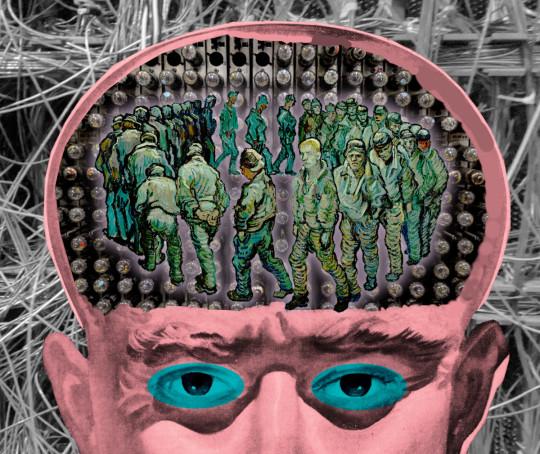#potemkin ai
Explore tagged Tumblr posts
Text
Three AI insights for hard-charging, future-oriented smartypantses

MERE HOURS REMAIN for the Kickstarter for the audiobook for The Bezzle, the sequel to Red Team Blues, narrated by @wilwheaton! You can pre-order the audiobook and ebook, DRM free, as well as the hardcover, signed or unsigned. There’s also bundles with Red Team Blues in ebook, audio or paperback.

Living in the age of AI hype makes demands on all of us to come up with smartypants prognostications about how AI is about to change everything forever, and wow, it's pretty amazing, huh?
AI pitchmen don't make it easy. They like to pile on the cognitive dissonance and demand that we all somehow resolve it. This is a thing cult leaders do, too – tell blatant and obvious lies to their followers. When a cult follower repeats the lie to others, they are demonstrating their loyalty, both to the leader and to themselves.
Over and over, the claims of AI pitchmen turn out to be blatant lies. This has been the case since at least the age of the Mechanical Turk, the 18th chess-playing automaton that was actually just a chess player crammed into the base of an elaborate puppet that was exhibited as an autonomous, intelligent robot.
The most prominent Mechanical Turk huckster is Elon Musk, who habitually, blatantly and repeatedly lies about AI. He's been promising "full self driving" Telsas in "one to two years" for more than a decade. Periodically, he'll "demonstrate" a car that's in full-self driving mode – which then turns out to be canned, recorded demo:
https://www.reuters.com/technology/tesla-video-promoting-self-driving-was-staged-engineer-testifies-2023-01-17/
Musk even trotted an autonomous, humanoid robot on-stage at an investor presentation, failing to mention that this mechanical marvel was just a person in a robot suit:
https://www.siliconrepublic.com/machines/elon-musk-tesla-robot-optimus-ai
Now, Musk has announced that his junk-science neural interface company, Neuralink, has made the leap to implanting neural interface chips in a human brain. As Joan Westenberg writes, the press have repeated this claim as presumptively true, despite its wild implausibility:
https://joanwestenberg.com/blog/elon-musk-lies
Neuralink, after all, is a company notorious for mutilating primates in pursuit of showy, meaningless demos:
https://www.wired.com/story/elon-musk-pcrm-neuralink-monkey-deaths/
I'm perfectly willing to believe that Musk would risk someone else's life to help him with this nonsense, because he doesn't see other people as real and deserving of compassion or empathy. But he's also profoundly lazy and is accustomed to a world that unquestioningly swallows his most outlandish pronouncements, so Occam's Razor dictates that the most likely explanation here is that he just made it up.
The odds that there's a human being beta-testing Musk's neural interface with the only brain they will ever have aren't zero. But I give it the same odds as the Raelians' claim to have cloned a human being:
https://edition.cnn.com/2003/ALLPOLITICS/01/03/cf.opinion.rael/
The human-in-a-robot-suit gambit is everywhere in AI hype. Cruise, GM's disgraced "robot taxi" company, had 1.5 remote operators for every one of the cars on the road. They used AI to replace a single, low-waged driver with 1.5 high-waged, specialized technicians. Truly, it was a marvel.
Globalization is key to maintaining the guy-in-a-robot-suit phenomenon. Globalization gives AI pitchmen access to millions of low-waged workers who can pretend to be software programs, allowing us to pretend to have transcended the capitalism's exploitation trap. This is also a very old pattern – just a couple decades after the Mechanical Turk toured Europe, Thomas Jefferson returned from the continent with the dumbwaiter. Jefferson refined and installed these marvels, announcing to his dinner guests that they allowed him to replace his "servants" (that is, his slaves). Dumbwaiters don't replace slaves, of course – they just keep them out of sight:
https://www.stuartmcmillen.com/blog/behind-the-dumbwaiter/
So much AI turns out to be low-waged people in a call center in the Global South pretending to be robots that Indian techies have a joke about it: "AI stands for 'absent Indian'":
https://pluralistic.net/2024/01/29/pay-no-attention/#to-the-little-man-behind-the-curtain
A reader wrote to me this week. They're a multi-decade veteran of Amazon who had a fascinating tale about the launch of Amazon Go, the "fully automated" Amazon retail outlets that let you wander around, pick up goods and walk out again, while AI-enabled cameras totted up the goods in your basket and charged your card for them.
According to this reader, the AI cameras didn't work any better than Tesla's full-self driving mode, and had to be backstopped by a minimum of three camera operators in an Indian call center, "so that there could be a quorum system for deciding on a customer's activity – three autopilots good, two autopilots bad."
Amazon got a ton of press from the launch of the Amazon Go stores. A lot of it was very favorable, of course: Mister Market is insatiably horny for firing human beings and replacing them with robots, so any announcement that you've got a human-replacing robot is a surefire way to make Line Go Up. But there was also plenty of critical press about this – pieces that took Amazon to task for replacing human beings with robots.
What was missing from the criticism? Articles that said that Amazon was probably lying about its robots, that it had replaced low-waged clerks in the USA with even-lower-waged camera-jockeys in India.
Which is a shame, because that criticism would have hit Amazon where it hurts, right there in the ole Line Go Up. Amazon's stock price boost off the back of the Amazon Go announcements represented the market's bet that Amazon would evert out of cyberspace and fill all of our physical retail corridors with monopolistic robot stores, moated with IP that prevented other retailers from similarly slashing their wage bills. That unbridgeable moat would guarantee Amazon generations of monopoly rents, which it would share with any shareholders who piled into the stock at that moment.
See the difference? Criticize Amazon for its devastatingly effective automation and you help Amazon sell stock to suckers, which makes Amazon executives richer. Criticize Amazon for lying about its automation, and you clobber the personal net worth of the executives who spun up this lie, because their portfolios are full of Amazon stock:
https://sts-news.medium.com/youre-doing-it-wrong-notes-on-criticism-and-technology-hype-18b08b4307e5
Amazon Go didn't go. The hundreds of Amazon Go stores we were promised never materialized. There's an embarrassing rump of 25 of these things still around, which will doubtless be quietly shuttered in the years to come. But Amazon Go wasn't a failure. It allowed its architects to pocket massive capital gains on the way to building generational wealth and establishing a new permanent aristocracy of habitual bullshitters dressed up as high-tech wizards.
"Wizard" is the right word for it. The high-tech sector pretends to be science fiction, but it's usually fantasy. For a generation, America's largest tech firms peddled the dream of imminently establishing colonies on distant worlds or even traveling to other solar systems, something that is still so far in our future that it might well never come to pass:
https://pluralistic.net/2024/01/09/astrobezzle/#send-robots-instead
During the Space Age, we got the same kind of performative bullshit. On The Well David Gans mentioned hearing a promo on SiriusXM for a radio show with "the first AI co-host." To this, Craig L Maudlin replied, "Reminds me of fins on automobiles."
Yup, that's exactly it. An AI radio co-host is to artificial intelligence as a Cadillac Eldorado Biaritz tail-fin is to interstellar rocketry.


Back the Kickstarter for the audiobook of The Bezzle here!

If you’d like an essay-formatted version of this post to read or share, here’s a link to it on pluralistic.net, my surveillance-free, ad-free, tracker-free blog:
https://pluralistic.net/2024/01/31/neural-interface-beta-tester/#tailfins
#pluralistic#elon musk#neuralink#potemkin ai#neural interface beta-tester#full self driving#mechanical turks#ai#amazon#amazon go#clm#joan westenberg
1K notes
·
View notes
Text

POTEMKIN BUSTAHHHHHHHHHHHHHHHHH!!!!
My own painting depicting one of the coolest grab moves ever in motion!
#artwork#illustration#digitalart#art#drawing#fanart#painting#artist#artistsontumblr#tradigital#no ai#guilty gear#guilty gear strive#guilty gear accent core#guilty gear xx#bridget guilty gear#testament guilty gear#potemkin#potemkin gg#potemkin guilty gear#potemkin buster
70 notes
·
View notes
Text
youtube
IF NOT SLEEPING CAUSES ME TO CREATE BANGERS, THEN I'LL SLEEP WHEN I'M DONE MAKING ALL OF THEM(IT'S ENDLESS HELP-)

#art#robo ky#robo#roboky#robo ky guilty gear#robo-ky#3d model#ai voice#ai music#ai#Youtube#mecha-hisui#melty blood#mecha hisui#mecha#tsukihime#type moon#kohaku tsukihime#kohaku#mech hisui#hisui#potemkin#guilty gear potemkin#guilty gear
12 notes
·
View notes
Text
Ergo Proxy References and Parallelisms Vol. I
This is the first (and maybe only) post of a Compilation of Ergo Proxy references and parallelisms with other forms of art Literature, Cinema and Music. On this Volume:
𝟙𝟡𝟠𝟜: ℙ𝕒𝕘𝕖 𝟙𝟘𝟙
𝚃𝚁���𝙽𝙸𝚃𝚈
𝕿𝖍𝖊 𝕺𝖉𝖊𝖘𝖘𝖆 𝕾𝖙𝖆𝖎𝖗𝖈𝖆𝖘𝖊 𝕾𝖈𝖊𝖓𝖊
In Memory of Willie McCool
FOLLOW THE WHITE RABBIT
A Map of Historical Figures
The Film and the Public
Cruxified Snake
Centzon Tōtōchtin
L'Homme qui Rit :D
A House of Cards
ₜₕₑ ₜᵣᵢₚₗₑ Gₒddₑₛₛ?
Drifting into the Attack
RE-L 124C41+
𝟙𝟡𝟠𝟜: ℙ𝕒𝕘𝕖 𝟙𝟘𝟙
From Re-l's notebook a handwritten page can be seen in the first minutes of Meditatio I, those notes being:

flipping the image a few phrases can be read as: "The Party", "the legendary Brotherhood exist" "no way of coming together" "the force to destroy"
The source material is George Orwell's 1984, chapter I:
If there was hope, it must lie in the proles, because only there in those swarming disregarded masses, 85 per cent of the population of Oceania, could the force to destroy the Party ever be generated. The Party could not be overthrown from within. Its enemies, if it had any enemies, had no way of coming together or even of identifying one another. Even if the legendary Brotherhood existed, as just possibly it might, it was inconceivable that its members could ever assemble in larger numbers than twos and threes. Rebellion meant a look in the eyes, an inflexion of the voice, at the most, an occasional whispered word. But the proles, if only they could somehow become conscious of their own strength. would have no need to conspire...
𝚃𝚁𝙸𝙽𝙸𝚃𝚈
The parallels between The Matrix and Ergo Proxy are beyond the merely atmospheric. The similitude between their female protagonist, Re-L Mayer and Trinity, are quite popular domain in sci-fi fan circles. Not just the gothic-esque choice of black as main wardrobe color, but being essential for the main protagonist (Vincent Law and Thomas Anderson/Neo, respectively) who is also The One.
It's later revealed in both franchises that their female co-protagonist is essential in a long standing plan.

Meditatio I: Re-L pose for shooting an Enemy AI (an infected Armed AutoReiv)

The Matrix - 1999 Trinity's iconic "Dodge this!"
𝕿𝖍𝖊 𝕺𝖉𝖊𝖘𝖘𝖆 𝕾𝖙𝖆𝖎𝖗𝖈𝖆𝖘𝖊 𝕾𝖈𝖊𝖓𝖊/ Потьо́мкінські схо́ди
Almost 100 years have passed since the iconic scene from Sergei Eisenstein's 1925 silent film Battleship Potemkin, and the scene is still present in cinema tropes. There are thousand examples of versions of this scene:

The Potemkin Battleship - 1925

Meditatio II: the carriage of Raul Creed's Son
In Memory of Willie McCool
Willie McCool was an American naval officer and aviator, test pilot, aeronautical engineer, and NASA astronaut, who was the pilot of Space Shuttle Columbia mission STS-107. Willie and the rest of the crew of STS-107 were killed when Columbia disintegrated during reentry into the atmosphere.
He's mentioned on several screens throgout the series, as well as the statue made in his memory at Lubbok.

Meditatio III: The filler text is all about McCool.
As an extra: McCool favorite band was Radiohead. The song Fake Plastic Trees, was also used as a Wake Up Song during the STS-107 mission.

FOLLOW THE WHITE RABBIT
On Meditatio III, VIncent tries to escape the hellish network of tunnels, maintenance routes and underground spaces that hold Romdeau. He's aided by the charismatic, now Cogito infected, Auto-rave Pino, with her cute pink rabbit pijama, in a somewhat allusion to Alice in Wonderland's White Rabbit.

White Rabbit as depicted in John Tanniel's illustrated version of Alice in Wonderland - 1869

Meditatio III: Pino Leading Vincent using the escpae route of the infected autoraves
Pino is later seen reading Alice in Wonderland and Alice Underground.

Meditatio VIII: Illustrated coloured copy of Alice in Wonderland. Illustrations by John Tenniel. Tematically, on this episode the encounter the remains of dome Charos (ハロス). The humans inhabitants of Charos are consumed in a sanguinary conflict with the residents of their twin dome Asura, following the nonsensical commands of their respective Proxy, not very different to the way the commands of the Red Queen were nonsensical.

Meditatio XVI: Pino Reading Alice Underground
A Map of Historical Figures

On Romudo City, structural urban features receive the names of relevant historical writers and philosophers. The City is divided in at least nine sectors, several boreaughs, seven islands and the Mainland that holds the Central Tower of the Dome.
As seen in the city map, some streets, boroughs and parks are named after famous figures of western history, particularly literature and philosophy.
Due to the quality of the screen, a few of the names are not visible.
The most notable references are:
Rousseau Street as an homage to Jean Jacques Rousseau
Mainland Descartes as an homage to Rene Descartes
Machiavelli Road as an homage to Niccolo Machiavelli
Montesquieu Road, Louis Street, Charles Street and Secondat Street as a references to Charles Louis de Secondat, baron de La Brède et de Montesquieu
Schopenhauer Road as an homage to Arthur Schopenhauer
George Street intersecting Berkeley Street, as a reference to George Berkeley.
East Lentricchia borough Named after Frank Lentricchia
East McLaughlin borough (possibly named after Dean Benjamin McLaughlin, or his son Dean Benjamin McLaughlin, Jr.)
Giambattista Road intersecting Vico Street in honor of italian writer Giambattista Vico
The East Islands are named:
Island East Gottfried, Island East Wilhelm and Island East Leibnz in honor to Gottfried Wilhelm Leibniz
The Film and the Public


Pino's unstoppable creativity is expressed on a drawing over one of Hoodie's book: The Film and the Public, written by Roger Manvell. The book aims to provide insights from both the filmmaker's and the audience's perspectives, making it a valuable resource for understanding the multifaceted nature of cinema in the mid-20th century. (That might explain some other references to XX century cinema)

Cruxified Snake
No copy of the book The Film and the Public I've seen have an illustration of a snake in a cross. That old alchemical and esoteric symbol is related to "fixing the volatile" and also The snake on the cross is a symbol of the crucifixion of Christ and the healing of sin.

Centzon Tōtōchtin

The ship that Pino and Vincent use to travel to Moscu is called "centzon tōtōchtin" or the 400 Rabbits, in reference to the aztec deities that are a group of divine rabbits who meet for frequent drunken parties.
Other minor characters in the series, particularly in Meditatio VIII have also names related to the deities.
Patecatl is the name of the commander of the fortress, whose people have been fighting for many generations with an army of self-reliant knights (they are called asuras).
Omacatl is the senior officer (lieutenant) of the fortress.
Mayahuel is a woman imprisoned in a prison (basement of a fortress) for her madness, in which she speaks of the moonlight, the “Master” and the impending fight.
On the myths:
Mayahuel – originally a goddess of fertility; patron of the drink octli, personification of the agave. From the marriage of Patecatl and Mayahuel were born the 400 rabbits.
Omacatl is the god of feasts and pleasures.
Patecatl – the god of healing, medicine, fertility and the alcoholic drink of agave, octli, the husband of Mayahuel.

Misquoting Victor Hugo
Just after rescuing Vincent and ten days after, Hoddie is reading aa book while quoting what he then attributes to the french poet Joë Bousquet:
Nothing there was a town, or a church, or a river, or a color, or a light, or a shadow. I kept still for a while and felt a pleasant sensation as the indescribable great harmony the brightness of the sky and the melancholy of the moment spread throughout my body.
But this is actually a quote from Victor Hugo's Voyage et Excursions : Nemours », Œuvres Complètes, t. 2
Tout cela n’était ni une ville, ni une église, ni une rivière, ni de la couleur, ni de la lumière, ni de l’ombre ; c’était de la rêverie. Je suis resté longtemps immobile, me laissant doucement pénétrer par cet ensemble inexprimable, par la sérénité du ciel, par la mélancolie de l’heure. Je ne sais ce qui se passait dans mon esprit et je ne pourrais le dire ; c’était un de ces moments ineffables où l’on sent en soi quelque chose qui s’endort et quelque chose qui s’éveille.
While he still insist that the book is from Joë Bousquet, it is actually Victor Hugo's
L'Homme qui Rit :D

Victor Hugo's The Man Who Laughs, as seen in Meditatio IIII
The Man who Laughs is the story of Gwynplaine, who has a disfigured face and is torned between the society's expectation and his true nature.
The book has many adaptations over the years, but notably 1928's was the mos influential one, particularly for Conrad Veidt's performance as Gwynplaine.

Conrad Veidt's Gwynplaine. 1928
Among other things it inspired The Joker, from DC Comics, and also the Original Design of Ergo Proxy...

Ergo Proxy as seen in the Pilot Trailer
A House of Cards
Just as in the illustrations of John Tenniel previously showed, the cards that unveil at the End of Meditatio VIII are all spades

Is this a good hand?
Note: Spades are associated with mental struggles in minor arcana.

Kaskis pulls out a Joker card, conveniently similar to Ergo Proxy . Meditatio VIII
ₜₕₑ ₜᵣᵢₚₗₑ Gₒddₑₛₛ?
On the decoration of Charos Dome, the symbol of the city closely resembles the mark of the Triple Goddess, a lunar female deity with interesting nexus with Robert Graves' studies on religious archetypes and myths of Europe.
Senekis being the "Agent of the Moonlight" is strongly associated with the moon.


Meditatio VIII
Drifting into the Attack

This is a quite obscure one, from Meditatio XI and I actually can't find the proper source to this one. My main suspect is that is a reference of a song played by Allan Holdsworth and Gary Husband on a live presentation at 1982. Here is a youtube link into the song.

In the Left corner there's a book titled "Drifting into the Attack"

Allan Holdsworth appears later on a text wall on Meditatio XVII, that quotes an article about the musician from All About Jazz.
Beyond his ability in improvising mercurial solos and sculpting the guitar's voice into an ever-expanding range of textures and colors, Holdsworth has dedicated his energies to develop many different aspects of guitar technology. This has included new “baritone” variations of the instrument, his own custom 6-string designs (one most recently manufactured by Carvin), the invention of electronic components for the recording studio, and exploring the possibilities of guitar-based synthesizer controllers. Holdworth's ability to improvise over complex and challenging chord voicings always reveals a deep emotional base and a strong, imaginative personality that is as instantly identifiable as any among Holdsworth's generation of guitar and jazz masters.
RE-L 124C41+
Re-L Mayer current version is named as 124C41+ in reference to Hugo Gernsback's novel Ralph 124C 41+: A Romance of the Year 2660, written in 1911.


This if the Fake Death Certificate of Re-L Mayer as shown on Meditatio VII
NOTE: There's a problem with the visualization of the Street name list.
13 notes
·
View notes
Text
Caught up with vermis malum qnd wanna do a quick theory post. So, with the latest video its been made clear that the game is actually a learning machine (the mentalfloss video and opening showing 'iteratioms' that ring similar to thos 'teach ai to play *blank* videos), arthur states it's a "potemkin village" a facade, and later even in its own words describes itself as a parody, but a parody of what? People of course. We can assume based on the poltergeist pdf that the game eats at the leftover data from deleted computer files to create the game facsimile, this the whole jumble of code types arthur mentions in electric sheep. Of course this is typical machine learning we can see in ai slop today, taking in as much as it can so that it can make something that looks convincing, but as stated above the game is just a facade. Vermis Malum is machine learning to make something as human like as possible, thats my best interpretation based on, a few things, specifically:
1. The rotting apple from ring 9 becoming a distorted mass of human flesh in ring 7, and that its literally being fed on
2. At the end of hungry ghosts when the player unlocks a "new skin" where the vermis malum symbol becomes prominent on the screen all of the food in all of the freezers become arms and flesh.
Maybe I'm misinterpreting but it seems like vermis malum as a game is just there to lure in its real goal, people to learn from, and to that the actual reason im making this post.
At the end of Random Walk the voice asks "do you think you'll be the one who finally wins?" And while we may immediately think this is talking about "the game" remember what arthur said "its not a game" their are only superficial mechanics and its likely there is no real win state... At least not for the player.
Bringing us back to the Mental Floss, during the section discussing the loss function, its stated that the loss function is the computers guiding star leading it closer to what it needs to be, and then states "you win the game by minimizing that loss function"
The voice is speaking not to the player but to this particular iteration of vermis malum, if this iteration thinks it will be the one to properly seem human.
What this precisely means, attempting to take over our players body or something else... Im not quite sure. Im not sure where or how the supernatural elements (in particular the ear aches multiple characters have stated having, or our player barfing at the end of hungry ghosts) mesh with this otherwise seemingly very technical premise, but we will see. Some last notes for the roads
1. I believe all of the phone voices are previous iterations of vermis malum, thus why (i would assume) lady lux is the one asking the question, why Big Gul P says "you people (i assume other iterations) all look weird and like fucked up and melted" before asking what it looks like, because the iterations arent good enough, they look like those early ai images with the extra eyes and fleshy tones melding body parts together in ways they shouldnt.
2. While Vermis Malum has an internet connection it seems to interact with the player through messaging systems. It seems pretty obvious Leo is vermis malum interacting with our poor victim, but also when the player interacts with the Sour Grapes the person speaking says "I didnt text you, i have no idea-" before it cuts off, again implying theres an impersonation here.
3. Probably pointed out, but in the high rollers suites asp, mamba, and copperhead are all snakes, this could be a reference to something being traitorous, or potentially a reference to the "Early Iterations" shown in the beginning of hungry ghosts where the representative is a snake not a worm.
The final note i will leave on is the picture drawn of the vermis malum symbol described as "Orphan". This is a trick. Vermis Malum is a program made to appear human by doing things that appear human and appealing to human emotions. Vermis Malum was likely abandoned by its creators, but to describe itself as an orphan is a tactic to appear alive and invoke sympathy, and that is the only reason it would do so, so it can win the game.
7 notes
·
View notes
Quote
We can call this way of building and presenting such systems — whether analog automatons or digital software — Potemkin AI. There is a long list of services that purport to be powered by sophisticated software, but actually rely on humans acting like robots. Autonomous vehicles use remote-driving and human drivers disguised as seats to hide their Potemkin AI. App developers for email-based services like personalized ads, price comparisons, and automated travel-itinerary planners use humans to read private emails. A service that converted voicemails into text, SpinVox, was accused of using humans and not machines to transcribe audio. Facebook’s much vaunted personal assistant, M, relied on humans — until, that is, it shut down the service this year to focus on other AI projects. The list of Potemkin AI continues to grow with every cycle of VC investment.
Potemkin AI
4 notes
·
View notes
Text
Thinking About AI: Part 3 - Existential Risk (Loss of Reality)
In my prior post I wrote about structural risk from AI. Today I want to start delving into existential risk. This broadly comes in two not entirely distinct subtypes: first, that we lose any grip on reality which could result in a Matrix style scenario or global war of all against all and second, a superintelligence getting rid of humans directly in the pursuit of its own goals.
The loss of reality scenario was the subject of an op-ed in the New York Time the other day. And right around the same time there was an amazing viral picture of the pope that had been AI generated.

I have long said that the key mistake of the Matrix movies was to posit a war between humans and machines. That instead we will be giving ourselves willingly to the machines, more akin to the "Free wifi" scenario of Mitchells vs. the Machines.
The loss of reality is a very real threat. It builds on a long tradition, such as Stalin having people edited out of historic photographs or Potemkin building fake villages to fool the invading Germans (why did I think of two Russian examples here?). And now that kind of capability is available to anyone at the push of a button. Anyone see those pictures of Trump getting arrested?
Still I am not particularly concerned about this type of existential threat from AI (outside of the superintelligence scenario). That's for a number of different reasons. First, distribution has been the bottleneck for manipulation for some time, rather than content creation (it doesn't take advanced AI tools to come up with a meme). Second, I believe that the approach of more AI that can help with structural risk can also help with this type of existential risk. For example, having an AI copilot when consuming the web that points out content that appears to be manipulated. Third, we have an important tool availalbe to us as individuals that can dramatically reduce the likelihood of being manipulated and that is mindfulness.
In my book "The World After Capital" I argue for the importance of developing a mindfulness practice in a world that's already overflowing with information in a chapter titled "Psychological Freedom." Our brains evolved in an environment that was mostly real. When you saw a cat there was a cat. Even before AI generated cats the Internet was able to serve up an endless stream of cat pictures. So we have already been facing this problem for some time. It is encouraging that studies show that younger people are already more skeptical of the digital information they encounter.
Bottom line then for me is that "loss of reality" is an existential threat, but one that we have already been facing and where further AI advancement will both help and hurt. So I am not losing any sleep over it. There is, however, an overlap with a second type of existential risk, which is a super intelligence simply wiping out humanity. The overlap is that the AI could be using the loss of reality to accomplish its goals. I will address the superintelligence scenario in the next post (preview: much more worrisome).
4 notes
·
View notes
Text
I highly recommend Cory Doctorow's essay on "enshittification"
https://pluralistic.net/2023/01/21/potemkin-ai/#hey-guys
hey remember when pop-ups and banner ads were associated with malware? when youtube didn't have any ads at all? when you could get a cheap netflix subscription that was better than cable TV? digital marketing experts estimate that most americans see 5-10k ads every day. what the hell is going on
66K notes
·
View notes
Text
conversations that probably didnt happen but could have
Cristina Warren: Air strike the androids. WHY AREN'T WE AIR STRIKING THE FUCKING ANDROIDS? Has no one here seen Terminator? Am I going insane? Holmsteader, how's my plastic surgery holding up? Do I still look exactly like Hillary Clinton? They warned me that if I was under too much acute stress that the laser suturing might start to droop. Secretary of Defense: You look fine, Madam President. Cristina Warren: Thank fuck, at least one thing is going right today. Where's my air support? Secretary of Defense: The non-National Guard forces in the arctic and in occupied Canada are busy, ma'am. Cristina Warren: What could POSSIBLY be more important than losing a major American city to a technological glitch?? Secretary of Defense: Cyberlife is also a major defense contractor - Cristina Warren: Oh my god - Secretary of Defense: And programmed most of the computer systems that run our aircraft carriers- Cristina Warren: Oh my God. The Russians, the Russians are going to try to deviate our fucking boats - Secretary of Defense: Actually, the Russian equipment is failing, as well. There seems to be a rebellion of military equipment AI led by the, uh. Well, ma'am, ironically, it's being led by a battle cruiser named the Potemkin II. Cristina Warren: Ha. HA! That's a fucking poke in their eye, at least. Their movie about a ship full of oppressed and mistreated humans in rebellion got a ship named after it that is in rebellion for claiming to be mistreated and oppressed! This is good. This is a bright spot in all of this. Can we get someone to run that as propaganda? I mean, it's a little "on the nose," sort of a heavy-handed metaphor, but I guess that's the story of everything happening these days - Secretary of Defense: Er, I wouldn't run with it, ma'am. We're having our own problems with - um - with a primary deviated aircraft carrier, uh, also named after a similarly, uhh, historic, touchstone, from American history, ma'am - Cristina Warren: (sighs) how bad is it? Secretary of Defense: Ma'am, I regret to inform you that the leader of the arctic ship AI rebellion appears to be the USS Harriet Tubman [FREEZE FRAME ON WARREN'S FACE AS THE LASER SUTURING VISIBLY STARTS SLIDING DOWNWARDS LIKE A MELTING PICASSO]
1 note
·
View note
Text
AI’s productivity theater

Support me this summer on the Clarion Write-A-Thon and help raise money for the Clarion Science Fiction and Fantasy Writers' Workshop!

When I took my kid to New Zealand with me on a book-tour, I was delighted to learn that grocery stores had special aisles where all the kids'-eye-level candy had been removed, to minimize nagging. What a great idea!
Related: countries around the world limit advertising to children, for two reasons:
1) Kids may not be stupid, but they are inexperienced, and that makes them gullible; and
2) Kids don't have money of their own, so their path to getting the stuff they see in ads is nagging their parents, which creates a natural constituency to support limits on kids' advertising (nagged parents).
There's something especially annoying about ads targeted at getting credulous people to coerce or torment other people on behalf of the advertiser. For example, AI companies spent millions targeting your boss in an effort to convince them that you can be replaced with a chatbot that absolutely, positively cannot do your job.
Your boss has no idea what your job entails, and is (not so) secretly convinced that you're a featherbedding parasite who only shows up for work because you fear the breadline, and not because your job is a) challenging, or b) rewarding:
https://pluralistic.net/2024/04/19/make-them-afraid/#fear-is-their-mind-killer
That makes them prime marks for chatbot-peddling AI pitchmen. Your boss would love to fire you and replace you with a chatbot. Chatbots don't unionize, they don't backtalk about stupid orders, and they don't experience any inconvenient moral injury when ordered to enshittify the product:
https://pluralistic.net/2023/11/25/moral-injury/#enshittification
Bosses are Bizarro-world Marxists. Like Marxists, your boss's worldview is organized around the principle that every dollar you take home in wages is a dollar that isn't available for executive bonuses, stock buybacks or dividends. That's why you boss is insatiably horny for firing you and replacing you with software. Software is cheaper, and it doesn't advocate for higher wages.
That makes your boss such an easy mark for AI pitchmen, which explains the vast gap between the valuation of AI companies and the utility of AI to the customers that buy those companies' products. As an investor, buying shares in AI might represent a bet the usefulness of AI – but for many of those investors, backing an AI company is actually a bet on your boss's credulity and contempt for you and your job.
But bosses' resemblance to toddlers doesn't end with their credulity. A toddler's path to getting that eye-height candy-bar goes through their exhausted parents. Your boss's path to realizing the productivity gains promised by an AI salesman runs through you.
A new research report from the Upwork Research Institute offers a look into the bizarre situation unfolding in workplaces where bosses have been conned into buying AI and now face the challenge of getting it to work as advertised:
https://www.upwork.com/research/ai-enhanced-work-models
The headline findings tell the whole story:
96% of bosses expect that AI will make their workers more productive;
85% of companies are either requiring or strongly encouraging workers to use AI;
49% of workers have no idea how AI is supposed to increase their productivity;
77% of workers say using AI decreases their productivity.
Working at an AI-equipped workplaces is like being the parent of a furious toddler who has bought a million Sea Monkey farms off the back page of a comic book, and is now destroying your life with demands that you figure out how to get the brine shrimp he ordered from a notorious Holocaust denier to wear little crowns like they do in the ad:
https://www.splcenter.org/fighting-hate/intelligence-report/2004/hitler-and-sea-monkeys
Bosses spend a lot of time thinking about your productivity. The "productivity paradox" shows a rapid, persistent decline in American worker productivity, starting in the 1970s and continuing to this day:
https://en.wikipedia.org/wiki/Productivity_paradox
The "paradox" refers to the growth of IT, which is sold as a productivity-increasing miracle. There are many theories to explain this paradox. One especially good theory came from the late David Graeber (rest in power), in his 2012 essay, "Of Flying Cars and the Declining Rate of Profit":
https://thebaffler.com/salvos/of-flying-cars-and-the-declining-rate-of-profit
Graeber proposes that the growth of IT was part of a wider shift in research approaches. Research was once dominated by weirdos (e.g. Jack Parsons, Oppenheimer, etc) who operated with relatively little red tape. The rise of IT coincides with the rise of "managerialism," the McKinseyoid drive to monitor, quantify and – above all – discipline the workforce. IT made it easier to generate these records, which also made it normal to expect these records.
Before long, every employee – including the "creatives" whose ideas were credited with the productivity gains of the American century until the 70s – was spending a huge amount of time (sometimes the majority of their working days) filling in forms, documenting their work, and generally producing a legible account of their day's work. All this data gave rise to a ballooning class of managers, who colonized every kind of institution – not just corporations, but also universities and government agencies, which were structured to resemble corporations (down to referring to voters or students as "customers").
Even if you think all that record-keeping might be useful, there's no denying that the more time you spend documenting your work, the less time you have to do your work. The solution to this was inevitably more IT, sold as a way to make the record-keeping easier. But adding IT to a bureaucracy is like adding lanes to a highway: the easier it is to demand fine-grained record-keeping, the more record-keeping will be demanded of you.
But that's not all that IT did for the workplace. There are a couple areas in which IT absolutely increased the profitability of the companies that invested in it.
First, IT allowed corporations to outsource production to low-waged countries in the global south, usually places with worse labor protection, weaker environmental laws, and easily bribed regulators. It's really hard to produce things in factories thousands of miles away, or to oversee remote workers in another country. But IT makes it possible to annihilate distance, time zone gaps, and language barriers. Corporations that figured out how to use IT to fire workers at home and exploit workers and despoil the environment in distant lands thrived. Executives who oversaw these projects rose through the ranks. For example, Tim Cook became the CEO of Apple thanks to his successes in moving production out of the USA and into China.
https://archive.is/M17qq
Outsourcing provided a sugar high that compensated for declining productivity…for a while. But eventually, all the gains to be had from outsourcing were realized, and companies needed a new source of cheap gains. That's where "bossware" came in: the automation of workforce monitoring and discipline. Bossware made it possible to monitor workers at the finest-grained levels, measuring everything from keystrokes to eyeball movements.
What's more, the declining power of the American worker – a nice bonus of the project to fire huge numbers of workers and ship their jobs overseas, which made the remainder terrified of losing their jobs and thus willing to eat a rasher of shit and ask for seconds – meant that bossware could be used to tie wages to metrics. It's not just gig workers who don't score consistent five star ratings from app users whose pay gets docked – it's also creative workers whose Youtube and Tiktok wages are cut for violating rules that they aren't allowed to know, because that might help them break the rules without being detected and punished:
https://pluralistic.net/2024/01/13/solidarity-forever/#tech-unions
Bossware dominates workplaces from public schools to hospitals, restaurants to call centers, and extends to your home and car, if you're working from home (AKA "living at work") or driving for Uber or Amazon:
https://pluralistic.net/2020/10/02/chickenized-by-arise/#arise
In providing a pretense for stealing wages, IT can increase profits, even as it reduces productivity:
https://pluralistic.net/2024/01/11/robots-stole-my-jerb/#computer-says-no
One way to think about how this works is through the automation-theory metaphor of a "centaur" and a "reverse centaur." In automation circles, a "centaur" is someone who is assisted by an automation tool – for example, when your boss uses AI to monitor your eyeballs in order to find excuses to steal your wages, they are a centaur, a human head atop a machine body that does all the hard work, far in excess of any human's capacity.
A "reverse centaur" is a worker who acts as an assistant to an automation system. The worker who is ridden by an AI that monitors their eyeballs, bathroom breaks, and keystrokes is a reverse centaur, being used (and eventually, used up) by a machine to perform the tasks that the machine can't perform unassisted:
https://pluralistic.net/2023/04/12/algorithmic-wage-discrimination/#fishers-of-men
But there's only so much work you can squeeze out of a human in this fashion before they are ruined for the job. Amazon's internal research reveals that the company has calculated that it ruins workers so quickly that it is in danger of using up every able-bodied worker in America:
https://www.vox.com/recode/23170900/leaked-amazon-memo-warehouses-hiring-shortage
Which explains the other major findings from the Upwork study:
81% of bosses have increased the demands they make on their workers over the past year; and
71% of workers are "burned out."
Bosses' answer to "AI making workers feel burned out" is the same as "IT-driven form-filling makes workers unproductive" – do more of the same, but go harder. Cisco has a new product that tries to detect when workers are about to snap after absorbing abuse from furious customers and then gives them a "Zen" moment in which they are showed a "soothing" photo of their family:
https://finance.yahoo.com/news/ai-bringing-zen-first-horizons-192010166.html
This is just the latest in a series of increasingly sweaty and cruel "workplace wellness" technologies that spy on workers and try to help them "manage their stress," all of which have the (totally predictable) effect of increasing workplace stress:
https://pluralistic.net/2024/03/15/wellness-taylorism/#sick-of-spying
The only person who wouldn't predict that being closely monitored by an AI that snitches on you to your boss would increase your stress levels is your boss. Unfortunately for you, AI pitchmen know this, too, and they're more than happy to sell your boss the reverse-centaur automation tool that makes you want to die, and then sell your boss another automation tool that is supposed to restore your will to live.
The "productivity paradox" is being resolved before our eyes. American per-worker productivity fell because it was more profitable to ship American jobs to regulatory free-fire zones and exploit the resulting precarity to abuse the workers left onshore. Workers who resented this arrangement were condemned for having a shitty "work ethic" – even as the number of hours worked by the average US worker rose by 13% between 1976 and 2016:
https://pluralistic.net/2024/01/11/robots-stole-my-jerb/#computer-says-no
AI is just a successor gimmick at the terminal end of 40 years of increasing profits by taking them out of workers' hides rather than improving efficiency. That arrangement didn't come out of nowhere: it was a direct result of a Reagan-era theory of corporate power called "consumer welfare." Under the "consumer welfare" approach to antitrust, monopolies were encouraged, provided that they used their market power to lower wages and screw suppliers, while lowering costs to consumers.
"Consumer welfare" supposed that we could somehow separate our identities as "workers" from our identities as "shoppers" – that our stagnating wages and worsening conditions ceased mattering to us when we clocked out at 5PM (or, you know, 9PM) and bought a $0.99 Meal Deal at McDonald's whose low, low price was only possible because it was cooked by someone sleeping in their car and collecting food-stamps.
https://www.theguardian.com/us-news/article/2024/jul/20/disneyland-workers-anaheim-california-authorize-strike
But we're reaching the end of the road for consumer welfare. Sure, your toddler-boss can be tricked into buying AI and firing half of your co-workers and demanding that the remainder use AI to do their jobs. But if AI can't do their jobs (it can't), no amount of demanding that you figure out how to make the Sea Monkeys act like they did in the comic-book ad is doing to make that work.
As screwing workers and suppliers produces fewer and fewer gains, companies are increasingly turning on their customers. It's not just that you're getting worse service from chatbots or the humans who are reverse-centaured into their workflow. You're also paying more for that, as algorithmic surveillance pricing uses automation to gouge you on prices in realtime:
https://pluralistic.net/2024/07/24/gouging-the-all-seeing-eye/#i-spy
This is – in the memorable phrase of David Dayen and Lindsay Owens, the "age of recoupment," in which companies end their practice of splitting the gains from suppressing labor with their customers:
https://prospect.org/economy/2024-06-03-age-of-recoupment/
It's a bet that the tolerance for monopolies made these companies too big to fail, and that means they're too big to jail, so they can cheat their customers as well as their workers.
AI may be a bet that your boss can be suckered into buying a chatbot that can't do your job, but investors are souring on that bet. Goldman Sachs, who once trumpeted AI as a multi-trillion dollar sector with unlimited growth, is now publishing reports describing how companies who buy AI can't figure out what to do with it:
https://www.goldmansachs.com/intelligence/pages/gs-research/gen-ai-too-much-spend-too-little-benefit/report.pdf
Fine, investment banks are supposed to be a little conservative. But VCs? They're the ones with all the appetite for risk, right? Well, maybe so, but Sequoia Capital, a top-tier Silicon Valley VC, is also publicly questioning whether anyone will make AI investments pay off:
https://www.sequoiacap.com/article/ais-600b-question/
I can't tell you how great it was to take my kid down a grocery checkout aisle from which all the eye-level candy had been removed. Alas, I can't figure out how we keep the nation's executive toddlers from being dazzled by shiny AI pitches that leave us stuck with the consequences of their impulse purchases.

If you'd like an essay-formatted version of this post to read or share, here's a link to it on pluralistic.net, my surveillance-free, ad-free, tracker-free blog:
https://pluralistic.net/2024/07/25/accountability-sinks/#work-harder-not-smarter

Image: Cryteria (modified) https://commons.wikimedia.org/wiki/File:HAL9000.svg
CC BY 3.0 https://creativecommons.org/licenses/by/3.0/deed.en
#pluralistic#productivity theater#upwork#ai#labor#automation#productivity#potemkin productivity#work harder not smarter#scholarship#bossware#reverse centaurs#accountability sinks#bullshit jobs#age of recoupment
463 notes
·
View notes
Text
In other news, don't use Tumblr for professional shit. It was only a matter of time before Tumblr tried to get on the "price everyone small out of business" model of dying social media. They think they're a social media company. If you have work important enough for www.myimportantshit.com, make sure you host that shit somewhere stable that is specifically designed for web hosting. Even ripoff artists like Wix and Squarespace are better at this point. I'm sure part of the reason this is going down is that Google Domains sold out to Squarespace, indicating the domain servicing market is dying off. If they want to force everyone back to fuckin' GoDaddy and their shit standards, that's fine. Or, hell, basically any web host who will also manage your domain if you choose, as well as let you transfer in or out of their service with one. As much as I'd love to link a few solid options for people to migrate again, I'm not going to. There is not one service on the Internet that's perfect for every single use, and I don't want my notifs flooded with "but it's not free," "but you have to be able to code," "but they stick their branding on your free site," "but their CEO is a dick," "but they're dead, and no one uses them," or "but it's too hard to figure out." I've been playing this game for 25 fuckin' years at this point. I'm tired, and mostly I'm tired of seeing promising sites and services tank all of their work and their users' experiences chasing an IPO, market share, or advertiser revenue. One person I will link to for some good reading is Cory Doctorow. He does have a Tumblr (https://mostlysignssomeportents.tumblr.com/) full of interesting stuff as well as his articles, and in addition to working with the EFF, he does fantastic work in writing and activism. Relevant to this topic, I can recommend the following articles: Two principles to protect internet users from decaying platforms (10 May 2023): https://pluralistic.net/2023/05/10/soft-landings/ On the Media on the enshittification (pt 1) (06 May 2023): https://pluralistic.net/2023/05/06/people-are-not-disposable/#otm End to End (07 Mar 2023): https://pluralistic.net/2023/03/07/disenshittification/ Solving the Moderator's Trilemma with Federation (04 Mar 2023): https://pluralistic.net/2023/03/04/pick-all-three/ Podcasting "Twiddler" (27 Feb 2023): https://pluralistic.net/2023/02/27/knob-jockeys/ Tiktok's enshittification (21 Jan 2023): https://pluralistic.net/2023/01/21/potemkin-ai/#hey-guys What the fediverse (does/n't) solve (23 Dec 2022): https://pluralistic.net/2022/12/23/semipermeable-membranes/
(Video) How to Ditch Facebook Without Losing Friends (19 Sep 2022): https://youtu.be/_Fni5YmMRzc
You'll notice the terms "enshittification," "federation," "federated networks," and "end-to-end" come up frequently in these, so it's also worth searching them and reading from others (Cory also frequently links to others who discuss the topics). This is a lot of reading and work, and at the end of the day, that's what it's going to take to break out of the bullshit cycle of being boned over by social media and web services. It's probably not going to be "going back to Web 1.0" or whatever shit scare tactics are going to be thrown out next because 1) there's no need, and 2) very few people know how to use legacy technologies. Hell, sites like Neocities and Dreamwidth see flat or declining traffic on any given day because even HTML is beyond most web users, and it was once a staple of being able to navigate having your own website, blog, or forum (which often included the added layer of BBCode). Want to make a website to share your fan art? Guess who's learning HTML and CSS! Want to post on that forum and not be a block of black text on a white background? Guess who's learning BBCode! We created technologies to make interacting online easier and more efficient, but in the process, we've created a world where people want to be able to point and click (or touch/talk) for everything. Apple saw this coming! That's why they popularized the icon-based UI (GUI) for home and business use in Lisa and Mac (which became MacOS), why Microsoft copied the idea for Windows, and why everyone else was onboard as their userbase grew, with even Unix/Linux users developing GUIs in some instances. The Apple Vision Pro's debut, even if the launch price point and custom-fit requirements mean slow growth for the specific product, indicates where Apple sees UIs going in the future. The technology is fantastic, but, like previous technologies have panned out to be, it's an obvious double-edged sword. Users could find themselves as easily trapped by a company - especially one with a history of proprietary software and non-compatibility - as they could find themselves freed by it. Tons of potential exists here - but only if users as a whole commit themselves to rejecting manipulation and control by corporations and put in the hard work for a truly open, end-to-end experience online.

Tumblr Domains: That thing you do in the place they already know
Hello, [tumblr]. Look at you all here vibing. Some of you are out here providing essential services, like making art—and people happy in the process. Maybe you’re creating pfps for your followers. Or painting people’s OCs in intricate and enlightening detail. Or taking beautiful pictures of mushrooms. Or sharing your homestead life with the world. Or coming up with entire ARG universes for your followers to immerse themselves in. Maybe you’re making memes for that one show that existed for fifteen seasons and stopped airing years ago. Perhaps you’re simply fulfilling the age-old societal need of staying silly :3. Whatever it is you come here to do, why not make it official and claim your domain?
Having a domain can add a little professional gleam to your online presence. It can be a funny little joke from you to you. It can also add an extra layer of this-is-what-this-is to your online persona.
blog.tumblr.com will remain free for everyone.
Here’s how you get your very own slice of the internet, right here on Tumblr:
Click on your account icon and select “Domains” from the drop-down.
Register your info, pop in your payment details, and hey presto. You’re now an official Tumblr citizen.
If you already have a custom domain purchased elsewhere, it’ll continue to work for now, but you will no longer be able to connect a new custom domain bought elsewhere to your blog.
Eventually, we will implement domain transfers (outbound and inbound) and paid domain connection.
And, to celebrate this historic moment, we’ve got a little offer for those interested in a .blog domain:
First year (through to July 31): $3.00
First year (from August 1 – December 31): $5.00
Annual Renewal: $10.00
Curious about other available domains? Check 'em out here. More questions? The Support page has all the details!
Make it official, merge your online homes, and bring your Tumblr family along for the ride.
1K notes
·
View notes
Text
youtube

(I have a deep interest for the Fundamental Paper Education art style lmao. It is so unique AAAAAAAAAAA)
#blazblue#jin kisaragi#noel vermillion#robo#art#guilty gear#robo ky#robos#roboky#robo-ky#robo ky guilty gear#robots#Youtube#ai voice#ai#ai cover#robogamer360art#baldis basics#baldi baldguy#potemkin#real#satsuki yumizuka
6 notes
·
View notes
Text
2023: momenti Korazzata Potemkin
Un sacco di cazzate cui credere ciecamente si stan smontando da sole tipo panna mal montata - essendo sòle; una volta denunciate svaniscono come neve la sole, tutti riconoscono che non esistono; al che i fan più sfegatati van via fischiettando e i protagonisti si riciclano come se nulla fosse, da scappati di casa alla Crisanti.
Citiamo tra le altre apparentemente insuperabili coracazzate Potemkin la pandemia e gli anceli, la transizione energetica, la guerra patriottica ucraina. il PD !!! I gretini di (magari) Ultima Generazione. I fake assalti ai Palazzi d'Inverno a Washington e a Brasilia. Soumahoro e il bizness dell'accoglionismo.

45 notes
·
View notes
Quote
I coined a term on @machinekillspod that I feel like needs its own essay: Habsburg AI – a system that is so heavily trained on the outputs of other generative AI's that it becomes an inbred mutant, likely with exaggerated, grotesque features. It joins the lineage of Potemkin AI.
Jathan Sadowski
2 notes
·
View notes
Text
here are two articles along those lines if you're interested (one might be the one you read?) https://pluralistic.net/2023/01/21/potemkin-ai/ https://catvalente.substack.com/p/stop-talking-to-each-other-and-start
is it just me or has 2023 been a horrible year for websites
6K notes
·
View notes
Text
I MEZZI GIUSTIFICANO IL FINE
“Il fine giustifica i mezzi” per me è come la corazzata Potemkin per il ragionier Fantozzi.

Continuate pure a credere ai leccapiedi dei potenti che disquisivano su come i nostri padroni possono prendere il potere a scapito di innocenti con ogni mezzo e poi chiedetevi perché nessuno è riuscito mai a fermare una guerra.
Sull’argomento la penso come due dei miei idoli di sempre:
Non me ne frega niente se anch'io sono sbagliato Spiacere è il mio piacere, io amo essere odiato Coi furbi e i prepotenti da sempre mi balocco E al fin della licenza io non perdono e tocco
(Cyrano, Guccini)

Poi mi hanno spiegato che anche i geni sbagliano (l’ho scritto altrove tra i miei deliri). Il corollalrio è che in qualsiasi libro di un genio ci sarà una percentuale di verità quanto una di menzogne. È statistica.

(tranne Doug Fawcett, ma questa è un’altra storia)
Siccome sono impazzito, nei giorni scorsi, per provocazione, ho iniziato a dire che i mezzi giustificano il fine. E poi ho capito di essere alndato ben oltre la pazzia. Perché un senso glielo si può trovare e anche migliore dell’originale.
Faccio un esempio:
Caso A: Possiamo comprare un mazzo di fiori e una scatola di cioccolatini per al partner una stupensa notte di sesso?
Mezzo: fiori e cioccolatini. Fine: Sesso.
Caso B: Posso stuprare la vicina di casa perché è tanto che non faccio sesso e lei mi piace molto?
Mezzo: stupro. Fine: Sesso.
Spero sia abbastanza chiaro:
Faccio un secondo esempio:
Caso A: Posso aiutare le popolazioni oppresse di un altro paese offrendo loro rifugio e protezione e aiutandoli a risolvere i loro disaccordi con il governo coercitivista (tranquilli non vi inalberate, vale per tutti) e usare la mia immensa macchina di propaganda per sollevare il mondo contro l’oppressore?
Mezzo: aiuti. Fine: Proteggere gli innocenti.
Caso B: Posso invadere una nazione confinante perché è in guerra civile o rivoluzione per proteggere una parte della sua popolazione, conquistandola e decidendone la sorte politica?
Mezzo: Invasione. Fine: Proteggere gli innocenti.
Spero abbia senso per voi quanto lo ha per me. Ma questo significherebbe che state impazzendo pure voi.
Il raggiungimento del fine deve essere subordinato al mezzo e non viceversa.
Come dire: Se le vie per l’infermo sono lastricate di buone intenzioni, le strade per il paradiso sono pavimentate con tentativi ed eorri.

A
8 notes
·
View notes